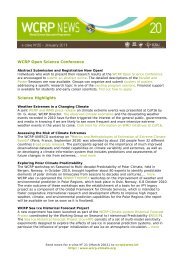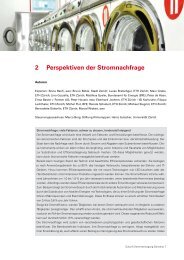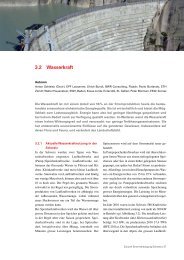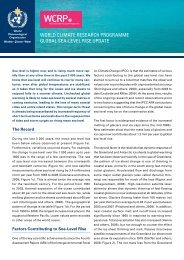Climate Change and Switzerland 2050 - OcCC - SCNAT
Climate Change and Switzerland 2050 - OcCC - SCNAT
Climate Change and Switzerland 2050 - OcCC - SCNAT
You also want an ePaper? Increase the reach of your titles
YUMPU automatically turns print PDFs into web optimized ePapers that Google loves.
52 <strong>Climate</strong> <strong>Change</strong> <strong>and</strong> Switzerl<strong>and</strong> <strong>2050</strong> | Agriculture<br />
9. National <strong>and</strong> global food supply<br />
International agricultural markets play an important role in the estimation of the future<br />
national <strong>and</strong> global food supply. By <strong>2050</strong>, the liberalisation of the markets <strong>and</strong> the adaptation<br />
of agricultural policy, in combination with the increasing dem<strong>and</strong> of emerging nations on the<br />
world market will affect food supply more strongly than global climate change.<br />
The effects of climate change on food supply in<br />
Switzerl<strong>and</strong> have to be considered against the<br />
background of the foreseeable market liberalisation<br />
in agriculture in the coming decades. Due<br />
to the increasing interconnectedness of international<br />
agricultural markets, local markets will be<br />
less shaped by local conditions because the consequences<br />
are spread within a larger system. On the<br />
other h<strong>and</strong>, effects caused elsewhere will be felt<br />
at the local level. As a result of the complete opening<br />
of agricultural markets, production with comparative<br />
cost disadvantages will decline. Certain<br />
plant products may be more affected by this than<br />
livestock husb<strong>and</strong>ry. 23<br />
On a global level, it can be assumed that agricultural<br />
production will be shifted to locations<br />
that become relatively more favourable from an<br />
agronomic perspective. For instance, Central <strong>and</strong><br />
Northern Europe will be climatically more favourable<br />
locations, whereas semi-arid regions will be<br />
climatically disadvantaged. This may cause supply<br />
uncertainty at specific locations.<br />
Global cereal production will generally decline<br />
<strong>and</strong> will move geographically. Due to the shift,<br />
<strong>and</strong> reinforced by trade liberalisation, agricultural<br />
markets <strong>and</strong> the international trade will<br />
become more important. Due to expected shortages,<br />
world market prices will rise. However,<br />
the effects on agricultural markets will largely<br />
depend on the general economic <strong>and</strong> global political<br />
situation, <strong>and</strong> will vary spatially. The global<br />
distribution problems will intensify. In addition,<br />
larger price fluctuations are to be anticipated<br />
due to the expected increasing intensity of meteorological<br />
extreme events. In particular, African<br />
countries will suffer from the consequences of climate<br />
change. The solidarity of northern countries<br />
with those in the south in terms of food supply<br />
will become more important.<br />
In Switzerl<strong>and</strong>, the contribution of agriculture<br />
to the GDP is marginal. The consequences –<br />
both positive <strong>and</strong> negative – of climate change<br />
on agriculture are therefore macroeconomically<br />
insignificant. Food dem<strong>and</strong> in Switzerl<strong>and</strong> can<br />
be covered by imports <strong>and</strong> supply problems are<br />
not expected.<br />
As Switzerl<strong>and</strong> is located in a climate zone that<br />
tends to be favourable, the comparative advantages<br />
of the location will increase. Generally,<br />
an increased risk is anticipated, which will be<br />
amplified by the structural changes that result<br />
in larger, more capital intensive farms with a<br />
higher degree of specialisation. However, structural<br />
change will also result in improved agility,<br />
professionalism <strong>and</strong> adaptability of the farms.<br />
Uncertainties<br />
The significance of the direct effects of climate<br />
change on domestic agriculture by <strong>2050</strong> remains<br />
uncertain in the context of other changes, mainly<br />
caused by alterations in international trade.

















